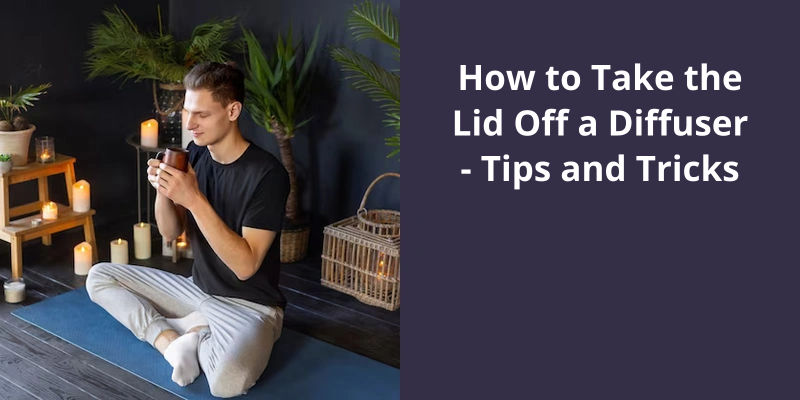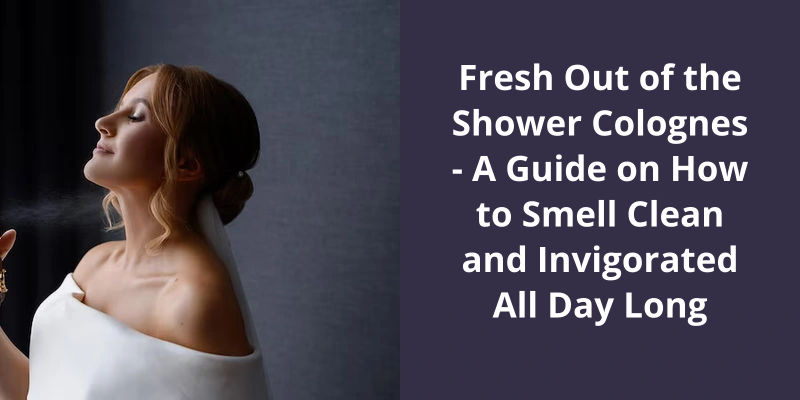The power of scent is deeply ingrained in human culture. From ancient times to present day, people have used perfumes and fragrances to add a touch of luxury and elegance to their lives. However, many people today struggle with the question of whether or not they can apply perfume without showering. Thankfully, there’s still a way to enjoy your favorite fragrances without sacrificing hygiene. Applying non-scented lotion before spritzing can help the scent last longer on your skin. So, whether you're in a hurry or just don't feel like showering, you can still smell amazing with a little help from moisturizer.

Should You Put Perfume on Wet or Dry Skin?
The question of whether to apply perfume on wet or dry skin is one that’s puzzled many people over the years. There are several factors to consider when making this decision, including the type of perfume youre using, the ingredients in the fragrance, and the overall effectiveness of the scent.
The reasoning behind this is that when your skin is wet, the pores are open and more receptive to fragrance. Additionally, the water on your skin can help to dilute the perfume slightly, which can help to make it more subtle and long-lasting. If you choose to go this route, be sure to apply the perfume immediately after your shower while your skin is still damp.
This may be because they feel that the scent lasts longer when it’s not diluted by water, or because they prefer a more intense fragrance.
It’s always a good idea to experiment and try out different techniques to see what works best for you and your chosen fragrance.
No matter which method you choose, it’s important to remember that less is often more when it comes to perfume. A few well-placed sprays or dabs are typically enough to create a beautiful scent that will last all day. And always be sure to store your perfume in a cool, dry place to help preserve it’s scent and quality for as long as possible.
Experiment with different methods and find what works best for you. And always use a light hand to avoid overpowering the people around you with your scent.
When it comes to wearing perfume, we all want it to last as long as possible. However, those with dry skin often find that their fragrance fades faster than they’d like. Luckily, there’s a simple solution that can help keep your scent on for longer – using petroleum jelly. By applying it to your pulse points beforehand, you can create a barrier that traps the fragrance and prevents it from dissipating too quickly. Let’s take a closer look at how this works.
How Do You Make Perfume Last Longer on Dry Skin?
Another way to make perfume last longer on dry skin is by moisturizing your skin beforehand. Use a fragrance-free lotion to moisturize your skin before applying your favorite perfume. The lotion will provide a barrier between your skin and the perfume, slowing down the evaporation process of the scent.
A well-known trick to make a fragrance last longer is by spraying it on your hairbrush before using it. This way, the fragrance will be distributed evenly all over your hair while you run your brush through it. It may also help to reduce the number of sprays used, which extends the life of your fragrance.
Perfume ingredients depend on temperatures to release fragrance. The higher the temperature, the faster it releases. Thus, it may be advised to apply perfume in places with higher temperatures such as neck, back of ears, wrist, and elbow folds. These areas are usually warmer than the rest of the body, which leads to a more proactive release of fragrance.
Lastly, avoid applying your fragrance right after a shower. Damp skin may rinse off the fragrance, not giving it a chance to stick. Instead, spray perfume onto a dry towel and rubbing onto areas like underarms, then proceeding to apply the fragrance like usual.
Using petroleum jelly, moisturizing with lotion, and applying fragrance on warm areas with less sweat glands action are few of those. Experimenting with these methods can help you personalize and extend the life of your favorite fragrance.
Tips for Choosing the Right Type of Perfume for Your Skin Type
- Understand Your Skin Type: Before purchasing any perfume, determine your skin type which may be dry, oily, or a combination of both.
- Choose the Right Fragrance Family: Your choice of fragrance will depend on the type of scents you like and the occasion.
- Fragrance Concentration: Fragrances come in different types of concentration which include eau de toilette, eau de parfum, and pure parfum.
- Consider the Season: During summer, go for lighter and fresher scents while during winter, consider warm and rich fragrances.
- Try Before You Buy: It’s always recommended to try the perfume on your skin before buying it to ensure that it reacts well with your skin.
Now that we’ve established the proper way to apply perfume on bare skin, let’s explore the potential risks and benefits of doing so. While some may argue that it’s better to avoid direct contact with skin, others swear by the method for both it’s effectiveness and longevity. So, can you put perfume on bare skin? Let’s find out.
Can You Put Perfume on Bare Skin?
Theres no doubt about it – perfume is a classic accessory that can make any outfit feel complete. But with so many different ways to wear it, it can be tough to decide whether or not it’s safe to put directly on your bare skin. The good news is, when done correctly, spraying perfume on your skin is perfectly safe and can even have some benefits!
First things first – when applying perfume to your skin, it’s important to be mindful of where youre spraying it. To avoid staining your clothes, take care to spray directly on your skin and allow it to dry before getting dressed. This can prevent any color transfer or unwanted marks from ruining your outfit. Once your perfume has dried on your skin, you can go ahead and get dressed without worrying about any damage.
But where should you actually spray your perfume on your skin? While many people simply apply it to their wrists and neck, there are several other pulse points on your body that can benefit from a spritz of fragrance. These include the elbows, behind the ears, and even on your ankles! By spraying your perfume on these pulse points, you can enhance the scent and ensure that it lasts longer throughout the day.
Finally, it’s important to remember that perfume is most effective when applied to clean, moisturized skin. This can help the scent to last longer and can also prevent any unwanted reactions from occurring. So before spraying your perfume on bare skin, take a few minutes to cleanse and hydrate your skin, giving it the perfect canvas for a beautiful, long-lasting scent.
Source: Is it harmful to use perfume on skin?..
While many of us love the instant burst of scent that comes with applying perfume directly on our skin, there are some things to keep in mind when doing so. Rubbing perfume on the skin may not be the best option, as it can cause damage to the skin over time. In the following sections, we will explore the dos and don’ts of applying perfume on your skin.
Is It Okay to Apply Perfume Directly on Skin?
Moreover, rubbing the perfume onto the skin breaks down it’s molecules, resulting in the fragrance becoming weaker and less long-lasting. This is because the heat that’s generated from the friction of rubbing your skin together causes the top notes of your perfume to evaporate faster than they should, leaving only the base notes to linger.
Instead, you should always apply perfume by spritzing it onto your body from a distance. This will allow the perfume to settle onto your skin without causing any damage. It’s recommended to spray perfume on pulse points where the skin is warmest, as this will help to intensify the scent. The pulse points include the wrists, neck, behind the ears, and the back of the knees.
Additionally, it’s essential to remember that perfume should be applied to clean, moisturized skin. This is because fragrance molecules adhere better to hydrated skin, which helps to prolong the scents longevity. However, if you must apply perfume to unclean skin, it’s best to use a fragrance-free moisturizer first, as residue from the perfume can react with oils and sweat on the skin, resulting in an unpleasant scent.
It’s also essential to ensure that you’re using the correct amount of perfume. Too much perfume can be overwhelming, and too little can be barely noticeable. A general rule of thumb is to use no more than three spritzes, but this can vary depending on the strength of the scent and the individuals personal preference.
While applying perfume can add that perfect finishing touch to your daily routine, it’s important to know where not to apply it. Avoiding certain areas can prevent irritation or even damage to your skin. Here are 5 spots you should never apply perfume, including the eyes, hair, hands, armpits, and genitals. Instead, consider spraying these fragrant scents on pulse points, such as behind the ears, on the wrists, or on the neck.
Where Not to Apply Perfume?
Perfume is a wonderful addition to anyones beauty and hygiene routine. It can uplift our moods, make us feel more confident, and leave a lasting impression on those around us. However, there are a few spots on our body where perfume should never be applied. These spots can cause irritation, allergic reactions, or discomfort, thereby defeating the purpose of using perfume in the first place.
Firstly, one of the most obvious spots to avoid spraying perfume is near your eyes. This is because the delicate skin around the eyes can get irritated and cause redness, swelling, and even blurred vision. Additionally, perfume contains alcohol and other chemicals that can harm your eyes, leading to eye infections or other eye-related problems.
Secondly, while it may seem tempting to apply perfume to your hair, this isn’t recommended. While hair can absorb scents, perfume can also cause your hair to dry out and become brittle, leading to hair damage and breakage. Applying perfume to your hair can also leave a residue that can attract dirt and pollutants, leading to an unpleasant smell.
Thirdly, spraying perfume on your hands may seem like a good idea, but this can also lead to problems. In particular, perfume can cause irritation or allergic reactions on the skin, especially for those with sensitive skin. Additionally, perfume applied to your hands can easily be transferred onto other surfaces, such as your phone or computer keyboard, leaving behind an unpleasant and overpowering smell.
Fourthly, perfume should never be applied to your armpits. This area of your body is already prone to sweat and bacteria, which can create an unpleasant smell. Applying perfume to your armpits can make this problem worse, as it can mix with sweat and bacteria, creating a stronger and more unpleasant scent.
Lastly, it may seem obvious, but perfume should never be applied to your genitals. This is because the sensitive skin in this area can easily become irritated or inflamed by the chemicals in perfume. Additionally, applying perfume to this area can create an overpowering scent that can be unpleasant for both you and your partner.
So, where should you apply perfume instead? A good rule of thumb is to apply it to areas of your body that are well-ventilated and away from sensitive skin. This can include your wrists, neck, behind your ears, or even your ankles. Additionally, you should apply perfume in a small amount to avoid overpowering those around you. By being strategic about where you apply perfume, you can enjoy it’s benefits without risking irritation or discomfort.
Types of Perfume and Their Ingredients: This Topic Can Delve Into the Different Types of Perfume (e.g. Eau De Parfum, Eau De Toilette, Etc.) and the Specific Ingredients That Make Up Perfume (e.g. Essential Oils, Alcohol, Etc.). It Can Also Explore the Impact of These Ingredients on the Skin and Body.
- Eau de Parfum – contains a higher concentration of fragrance oils, making it last longer on the skin. Ingredients include essential oils, alcohol, water, and fixatives.
- Eau de Toilette – contains a lower concentration of fragrance oils and is lighter in scent. Ingredients include essential oils, alcohol, and water.
- Eau de Cologne – contains an even lower concentration of fragrance oils and has a fresh, citrus scent. Ingredients include essential oils, alcohol, and water.
- Eau Fraiche – contains a very low concentration of fragrance oils and has a light, refreshing scent. Ingredients include water and a small amount of essential oils or alcohol.
- Perfume Oil – contains a high concentration of fragrance oils and has a more intense, longer-lasting scent. Ingredients include essential oils and carrier oils, such as jojoba or coconut oil.
- Ingredients commonly used in perfume include essential oils, synthetic fragrances, alcohol, fixatives, and water. Some ingredients, such as certain essential oils, can cause skin irritation or allergic reactions in some individuals.
Conclusion
It's important to prioritize moisturizing your skin to achieve optimal results. So go ahead and confidently apply your favorite perfume without fear of offending others.





